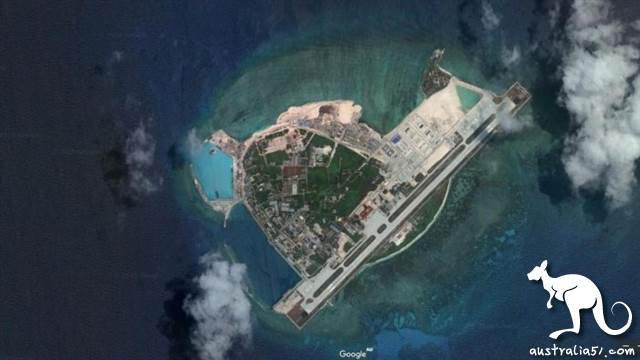
Following the u.s., australia officially declared beijing's claim to disputed territory in the south china sea illegal, heightening the risk of relationship deterioration with china.
Australia stated in a statement to the New York's Common Country headquarters that Australia denied China's claim to disputed islands and landforms in the South China Sea because it was incompatible with the Convention on the Law of the Sea and was therefore "invalid ".
The move came a few days before Australia and the United States were due to hold the annual Australia-US minister Summit (Ausmin) in Washington, and after the United States abandoned its neutral stance on Beijing's South China Sea claims.
Australia had previously urged all vocal parties to the disputed South China Sea islands and marine landscape to resolve their claims in accordance with international law.
However, the new statement submitted by the Permanent Representative of Australia to the Commonwealth Mitch Fifield to the Commonwealth on Friday, Australian time, denied China's claim and pointed out Malaysia, Vietnam and the Philippines' opposition to its claim.
"Australia government denies any claim by China that is incompatible with the 1982 Convention on the Law of the Sea of the Common Countries (UNCLOS), in particular its maritime claim that is incompatible with the Convention's classification of baselines, maritime areas and landforms ," the statement said.
Read here the complete common country material submitted by Australia
"China has no law basis for establishing a straight baseline, including the" four sands ", or "mainland" or "outlying" islands, by linking the outermost point of the South China Sea to the ocean landscape or "islands ".
"Australia denies any claims based on such straight baselines for internal waters, territorial waters, exclusive economic zones and mainland racks. "
Australia also denied China's territorial claim to the reefs and their artificial islands and stated that "land-building activities" could not change 《 the classification of landforms under the Convention on the Law of the Sea of the Common State.
"A right of territorial sea arising from a sea landscape beyond its natural state under UNCLOS is not law based ," it said.
The declaration referred in particular to China's claim that Spratly Islands( China called the Nansha Islands)—— where Australian warships were warned this week by the Chinese Navy and Parcel Islands( China called the Xisha Islands), stating that Australia disagreed with Beijing's claim that it was "widely accepted by the international community ".
The move will infuriate Beijing, which has taken a tougher diplomatic stance and has threat Australia to face trade sanctions and consumer boycott.
Earlier this month, U.S. Secretary of State Mike Pompeo (Mike Pompeo) denied China's controversial claims in the South China Sea and warned Beijing to pose "unprecedented threat ". to the region
"The world does not allow Beijing to view the South China Sea as its maritime empire ," Pompeo said.

The Australian diplomatic minister Marise Payne and U.S. Secretary of State Mike Pompeo met Picture: AFP Washington yesterday
The Federal Foreign minister Marise Payne and Defense minister Linda Reynolds will meet with Mr. Pompeo and U.S. Defense Secretary Mark Esper (Mark Esper) at this year's Australian-U.S. minister summit on Tuesday night, Australian time.
Two federal minister wrote in The Weekend Australian newspaper to denounce Beijing's "coercion" in the South China Sea and its human rights violations in Hong Kong, and to suggest that the communism regime threat. the Internet
At the minister summit, the two countries will sign a new agreement to fight false information backed by the state and support India's Pacific nations in fighting infectious diseases.
The two countries are also expected to conclude a new infrastructure-focused development programme to support the regional economic recovery, as well as a number of agreements to strengthen military cooperation and the development of defence technologies and to strengthen supply chains for essential commodities, including key minerals and medical supplies.
Senators Payne and Reynolds said that the meeting was held at a "critical moment" at a time when the new crown virus pandemic exacerbated the most difficult strategic challenge for generations in the Indo-Pacific region. "As allies, we sit down and find all possible ways to advance our common interests. This has never been more important than it is now," they wrote: "The extensive and vague National Security Law imposed on Hong Kong undermines The rights, freedom and future of millions.
"Coercive actions in the South China Sea, such as the escalation of disputes and the military of the landscape of disputes, continue to create tensions that destabilize the region. cyberattacks are increasing, while authoritarian government put the hope of the internet being open, collaborative, reliable and secure at risk. "
The prime minister, Scott Morrison, said in a video address on Friday that the Australian-US relationship had never been stronger or more important than it is now, announcing that Australia has always been responsible in the partner relationship.
"We are a trusted partner of the United States. And we trust each other ," he told the American Research Center (USSC). "As I said to President Trump at my meeting last year, Australia will certainly look to the United States. But we're not going to be America. And we bear the burden in this partnership relationship. "
However, the Prime Minister also sought to distinguish Australia's approach to Beijing from that of the United States, saying that Australia would take "our own action and our initiative ".

